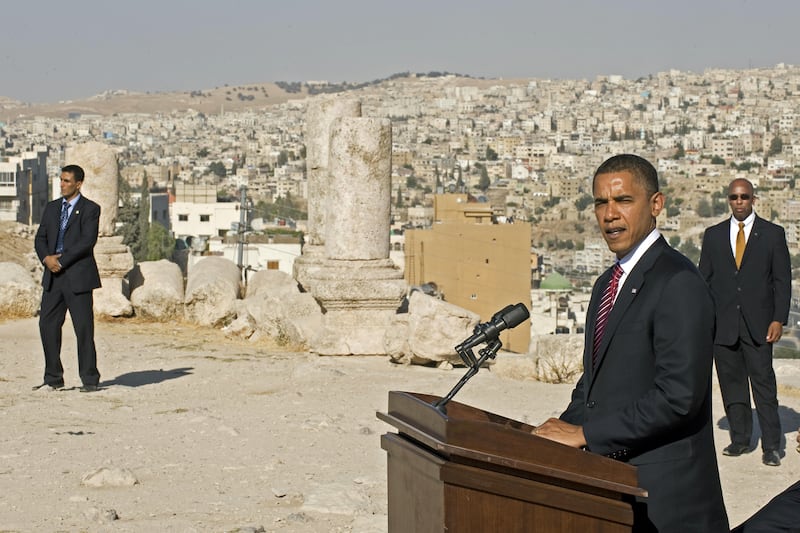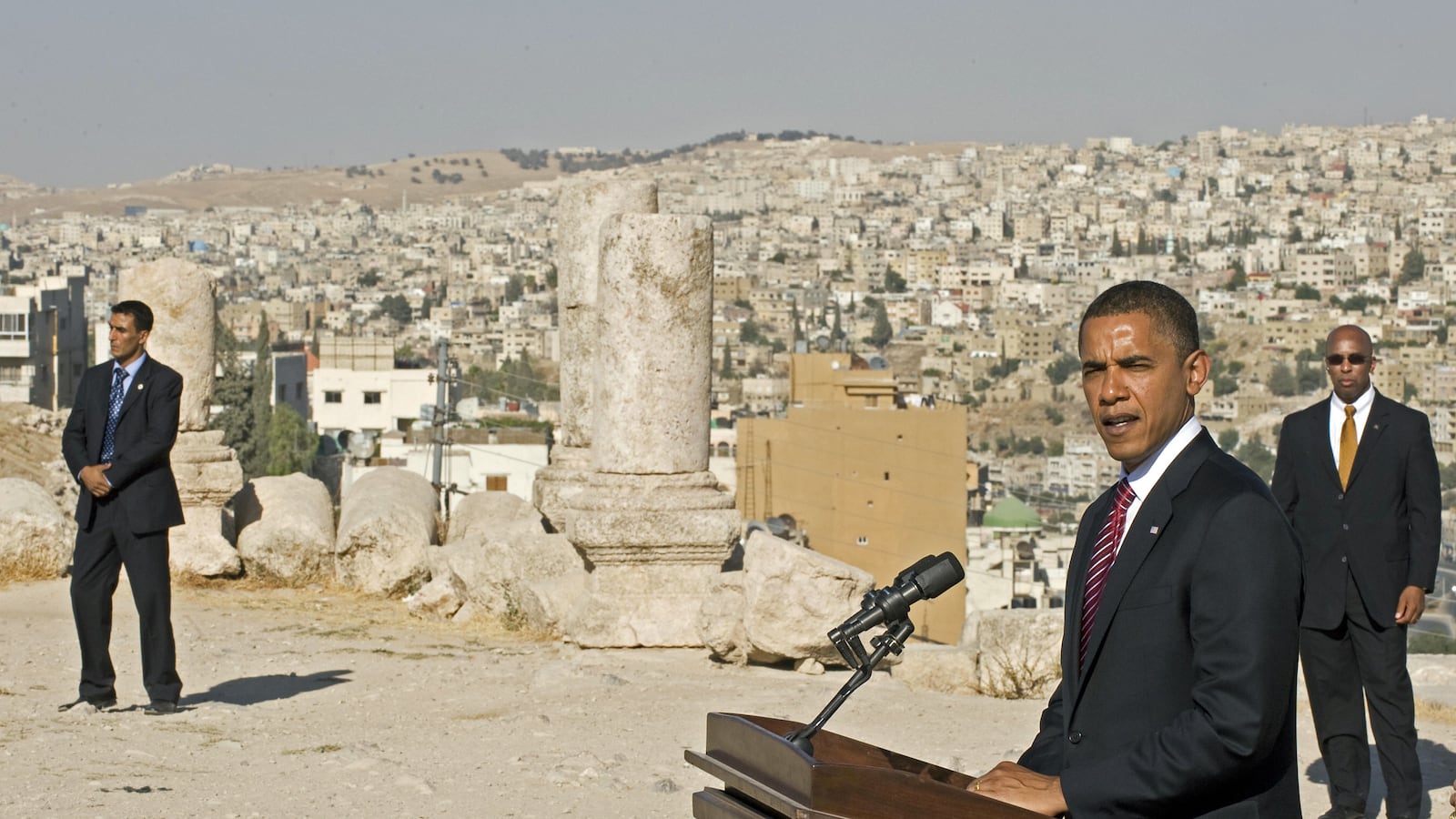For President Obama, embarking on a trip to Israel this week is an opportunity to repair relations with America’s primary Middle East ally. For the Secret Service agents whose job it is to keep him alive, it’s an enormous challenge. Dan Emmett spent 21 years in the Secret Service and served on presidential detail at various times during the administrations of George H.W. Bush, Bill Clinton, and George W. Bush—or, as he sometimes calls them, “41,” “42,” and “43.” After serving six years in the CIA, he is now retired and lives in Auburn, Alabama. The author of Within Arm’s Length: The Extraordinary Life and Career of a Special Agent in the United States Secret Service, Emmett talked to The Daily Beast about what it takes to keep the president safe on foreign detail, his prognosis for Obama’s trip, and why he doesn’t have fond memories of traveling abroad for work. Below is his story in his own words, with as much detail as he is allowed to disclose, edited for length and clarity.

When they come on board, all new agents start at a field office. You don’t start at protection. That comes later, once you’ve proven yourself in terms of work ethic, your ability with firearms, your ability to think on your feet, your ability to actually show up on time—once all those things are factored in, you might get a chance to go to presidential detail. My first overseas trip on presidential detail was the late summer of 1989. It was to Korea, Japan, and the Philippines, an Asian swing by George Herbert Walker Bush (“41”).
There are a lot of details that go into planning an overseas trip. If you take the difficulty of planning a standard domestic advance and you multiply that by about 20, that’s a foreign advance. You generally get about two weeks to do a foreign advance. A pre-advance goes out weeks before that, though there are a lot of things that have to be ironed out: visas, passports, weapons permits, those types of things. Billeting, hotels—where’s everyone going to stay? Because in addition to bringing over the security detail with the president, you’re going to probably have at least a hundred agents from all around the country that are going to go as post-standers. You have to have a place to store the vehicles because they come over separately on an Air Force transport. The logistics are somewhat staggering on an overseas advance. In order for it to all work perfectly and go smoothly (as, to outsiders, it appears to go), there’s a great deal of preparation and coordination between the Secret Service and the security and intelligence services of the host country.
The Secret Service, of course, has to be on its game and it always is. But there’s no way around it, you have to rely heavily on the locals because it’s their country. The Secret Service can’t come rolling into the Middle East like it can in Dallas, L.A., or Atlanta and start asking for things from the state and the local authorities. It doesn’t work that way on foreign trips, and a lot of places aren’t shy about reminding you of that: “This is not America, this is our country. You can ask us for anything you want, but in the end, this is what you’re going to get.”
Any time you’re in the Middle East, that’s a high-threat region. That’s no secret. It always has been and it always will be. You rely heavily on the local Israeli intelligence service. That’s their job—they are in a game of survival literally every day of their lives. They are surrounded by people who want to see them exterminated. And so they’re very good at security. Consequently, they do most of the work in terms of shutting things down and making sure that you’re safe and secure. Israel’s a very secure country, and one of the reasons is certainly because it has to be that way. Otherwise, Israel would cease to exist. Same with Palestine, it’s one of the most dangerous regions of the world.
I don’t have any real fond memories of foreign trips. A foreign vacation can be a lot of fun, because you plan it, you go where you want. A foreign advance is totally different. You’re going a country that, in a lot of cases, you would not want to visit on your own. And you’re working so much of the time. You’re dealing with sometimes six to seven to eight hours’ time difference. Your body is on a totally 180-around time schedule. You don’t know when you’re going to get to eat again, you don’t know when you’re going to get to sleep again. You’re just burning reserve power a lot of the time, just driving on adrenaline and willpower alone, trying to get these things done. That’s one of the big challenges, overcoming the physical adversity that is associated with foreign trips. In addition, it can be a challenge working with the locals. So a foreign trip for me … wasn’t exciting, it wasn’t thrilling, it wasn’t fun. It was some of the hardest work that an agent will ever do.
At the end of the day, in this business, if the president’s alive, you won. You had a good day. There are always glitches along the way. Nothing is gonna run smoothly 100 percent of the time. But because the Secret Service works so incredibly hard and are so incredibly good at what they do (and of course with the cooperation of the locals on these foreign trips), it has always turned out well. No country anywhere in the world wants the president of the United States to have a problem in that country. They’re very big on saving face in most of these places. They don’t want the headlines to be about something happening to the president in their country.
For President Obama’s trip to Israel, there really shouldn’t be any major obstacles. You run into problems when you visit countries we’ve never visited before or we haven’t visited frequently. Maybe the president hasn’t been there in 20 or 30 years, and you’re dealing with a whole new crew. Initially with the Russians, back in the ’80s, that was a big deal because when it was the Soviet Union, we didn’t go there a lot, and they didn’t come here a lot.
But presidents have been visiting Israel and Israeli prime ministers have been visiting the United States for quite some time. What you find is the agents from the Mossad and Shin Bet (from the Israeli intelligence service and security forces), the ones you work with when they come here are the same ones you work with there. Over time, you actually get to know them, develop a professional relationship with them and, in some cases, friendship … But you also have to take into account why you’re there. You’re there because it’s a given that there are a number of people in organizations in the world that want to kill the president. And you’re there to make sure that doesn’t happen.
A lot of the things that happened on those trips are classified, and they are so by necessity. If the entire world knew about some of the things that have gone on, that would simply help the terrorists and the bad guys to succeed the next time. All of those things are kept pretty close to the vest, but once again, if the president gets back home alive, then you had a pretty good trip.






